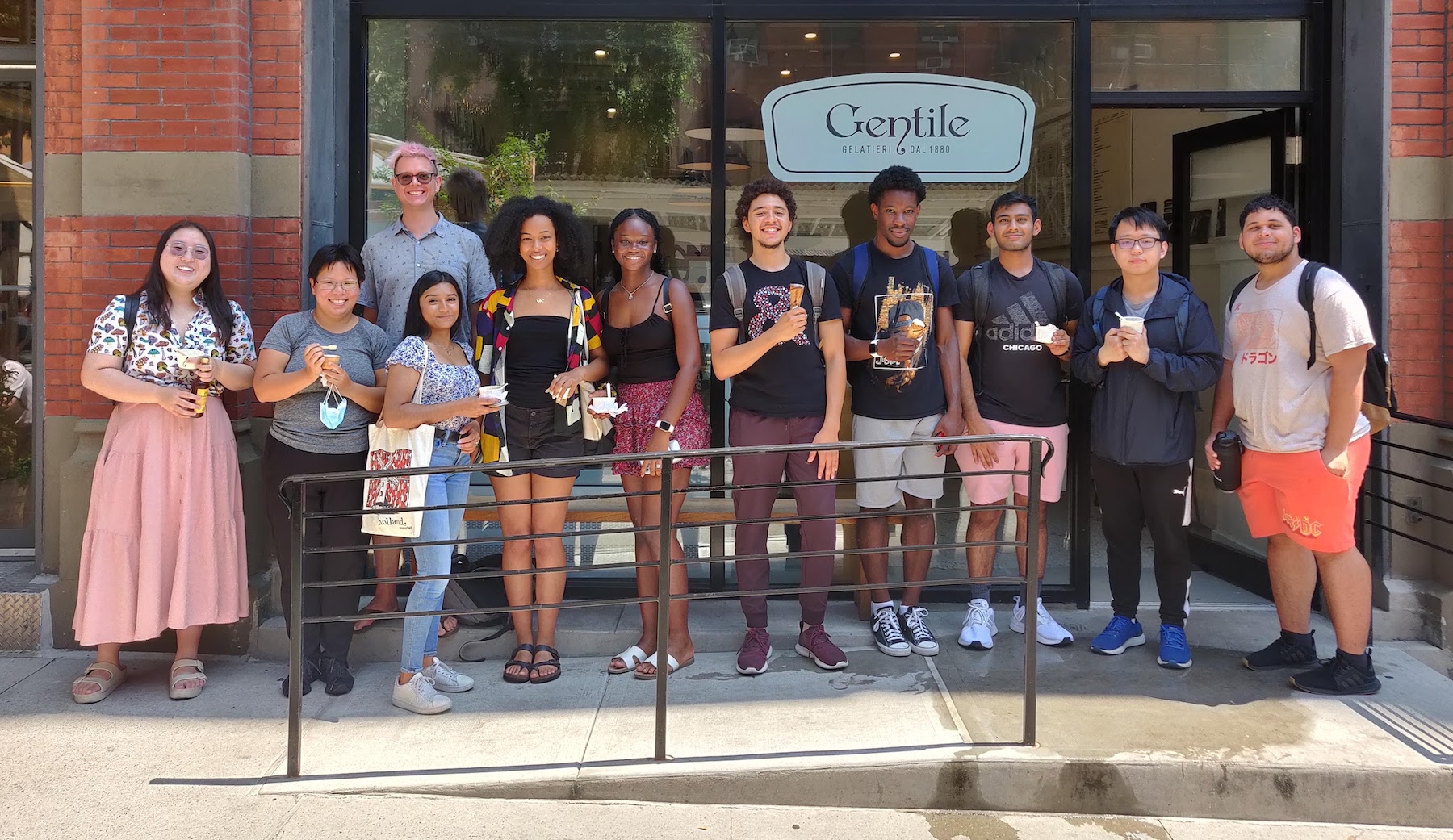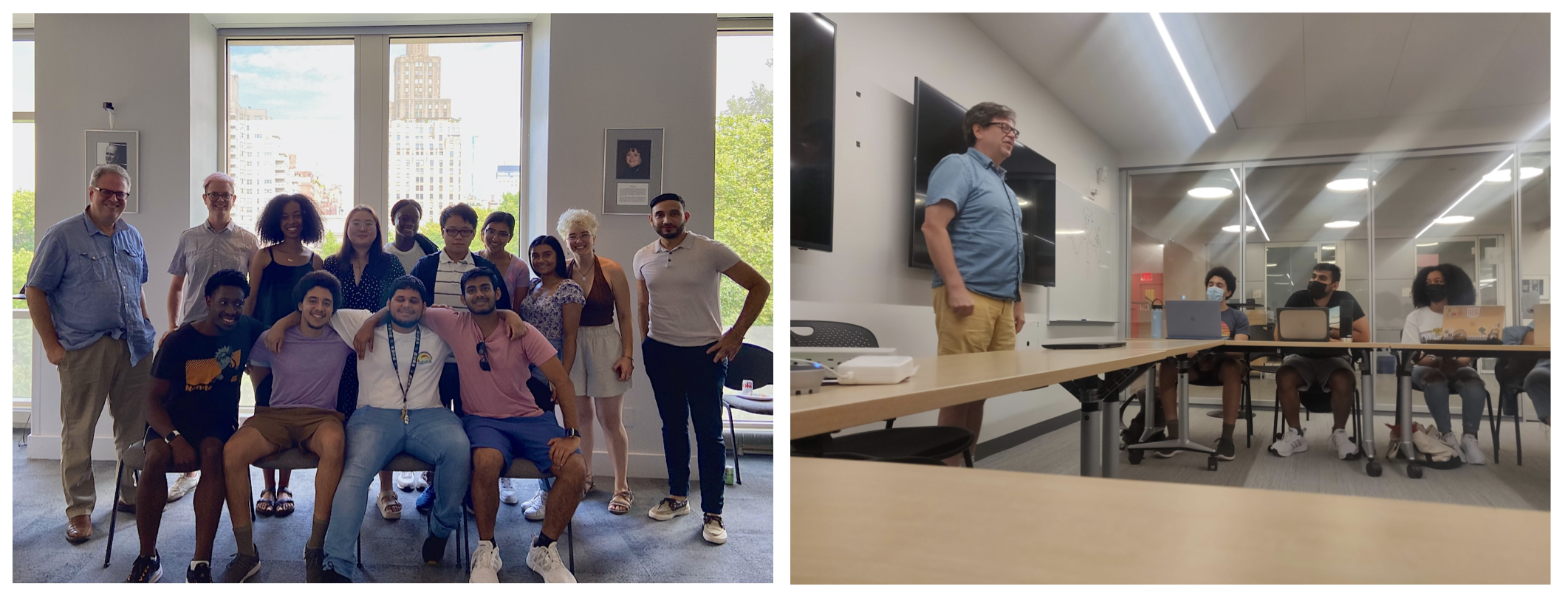
Launching a New Initiative, NYU and DeepMind Clear the Path for Future AI Researchers
By Sarah Ward
The students had returned from the edge, and they were ready for lunch. On a bright August morning, the group of ten—the inaugural class of the Pathways to AI initiative—had visited the Edge, a glass observation deck that hovers a hundred stories above Manhattan’s Hudson Yards. Now back at NYU for a celebratory luncheon, the students gazed out the windows of the Kimmel Center and identified the Edge’s sharp profile against the skyline. This morning’s outing was the last of many during the six-week program. “This was my first time in New York,” says Aadit Shah, a freshman at Ohio State University, “and I feel like we went everywhere. We went to Times Square, Central Park, Wall Street. It was amazing, a really nice way to get to know one another.” The ten students had come to the city from all around the United States and Puerto Rico, each undergraduate selected from nearly two-hundred applicants to participate in the launch of an ambitious new program.
A collaboration between NYU Courant and DeepMind, Pathways to AI aims to find the next generation of researchers by expanding the field to include those historically underrepresented in the sciences. “The Idea of the program is to increase diversity in the pipeline of researchers going into AI” says Matthew Zeidenberg, a Clinical Associate Professor of Computer Science and the program’s Faculty Coordinator. “Our aim is to enrich the education of the participants,” confirms Russel Caflisch, Director of the Courant Institute, “and attract them to jobs in AI research."
The task of selecting these first participants fell to the members of an admissions committee, which included Program Coordinator Olvy Nunez. “I was excited to participate in the Pathways to AI admissions' committee,” he says, “since I come from an underrepresented community myself, I've always been passionate in contributing to programs like these.” The committee focused on finding “the strongest candidates possible” during the selection process. And while Pathways to AI is designed for students from underrepresented populations, the program does not promote diversity for diversity’s sake. As Alfredo Canziani, an Assistant Professor and Program Instructor, explains, “If you have only one type of researcher working on a specific problem, their perspectives will be very similar, but if you have people from different backgrounds with different experiences, you may have different views on the same subject.” A variety of perspectives in AI research will “inevitably improve the overall result,” Canziani contends, making diversity a scientific priority as well as an ethical one.
For their part, the ten chosen undergraduates appreciated the opportunity to learn about AI from leading minds in the field—access made possible through the program's partnership with DeepMind. "The Courant Institute is tremendously grateful to DeepMind for their generous support, both financial and scientific, of the Pathways to AI program,” says Professor Caflisch, “This support is enabling us to bring a cohort of talented and diverse students to Courant to work on exciting research projects in AI.”
The program was divided into classes ("Big Ideas in AI" taught by Canziani, “Math for AI” taught by Fanny Shum, “Python for AI” taught by Yang Tang, and “Tools for AI” taught by Zeidenberg) and lab rotations—where the students were able to gain hands-on experience with current faculty and postdoc researchers. These rotations allowed the students to capture a glimpse into the life of an AI researcher. “You hear about research all the time,” says Tia Chen,“but you don’t know what it’s actually like.” Observing the day-to-day was enlightening for the students. Their small class size also enabled them to get additional help and attention from their instructors. “We grew really close,” says Aadit, “which helped in the classroom as well. We all lived on the same floor of the dorm so we could go and knock on each other’s doors and ask questions about our homework.” The group’s closeness is evident and endearing. “Getting to know everyone was the most fun part,” Malik Durant says as his classmates nodded in unison. Their visit to the Edge may have been the final Pathways to AI-sanctioned outing, but the group had made plans to meet up that evening and enjoy a final night on the town.
Malik, a sophomore majoring in Computer Science at Dillard University, held quite a narrow view of artificial intelligence before Pathways to AI. “I thought Oh AI, we’re doing robots,” he says, but the “eye-opening program” helped him see a variety of potential applications. Blessing Adomakoh, fellow student and a freshman at Pomona College, notes the common misconception: “People think AI is going to replace humans, but that’s not true. AI can be used in so many different ways to speed up processes in healthcare and advance medical technology.” Tia, who recently finished her first year at Tufts, found herself surprised by how interdisciplinary the subject could be. “We read philosophy,” she says, “and I discovered that I’m interested in ideas about fairness in AI.” She cites natural language processing as an example of bias in machine learning, where some models used by medical researchers have mistakenly attributed male pronouns to doctors and female pronouns to nurses. Tia now wants to help counter that issue. “I wouldn’t have known it was a possible direction if it weren’t for this program,” she says.
A shared source of surprise amongst the students is the newness of AI as a research area. “I thought AI was more advanced,” says Aadit, “but we’ve only made progress in the past ten years, and it’s going to keep growing exponentially.” Professor Zeidenberg confirms, “It’s a new field, the more you learn the less you know.” The comparative novelty of the subject increases the sense that this Pathways to AI class is getting in on the ground floor of artificial intelligence, and then holding the door open for those behind them. Poonam Sahoo, a Mathematics major at Stanford, says of her time in the program, “It’s just really rewarding, especially since any other tech space or STEM space I’ve been in has been very homogeneous and very skewed gender-wise or racially.” Pathways to AI has offered Poonam a different vision of her future in research. “Coming into this program, “ she continues, “where everyone is from different places, different programs, different schools, it is so valuable to learn and share resources. I feel like we learn a lot from each other.”

Above: The group poses with gelato on University Place.
Left: Students and mentors celebrate at the final luncheon.
Right: A talk on AI with Professor Yann LeCun.
